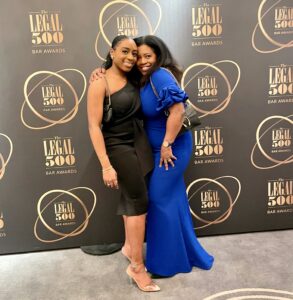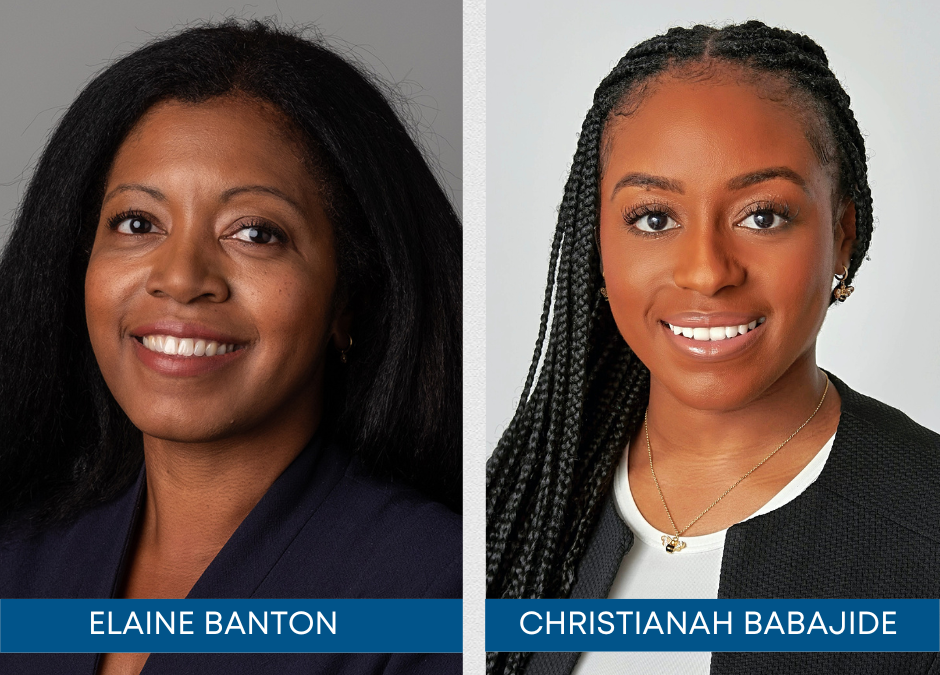
Commercial Awareness Update – W/C 28th October 2024
October 29, 2024
The Horse Hill Ruling: What Now for Fossil Fuel?
October 30, 2024
Elaine and Christianah at the Legal 500 Awards
By Christianah Omobosola Babajide.
Reading time: 10 minutes
In celebration of Black History Month, Christianah Babajide had the pleasure of interviewing Elaine Banton, Head of Employment at 7BR. Elaine is an experienced employment, equality, discrimination and human rights barrister focusing on complex and protracted litigation at all levels including landmark appeals. Often appearing in high profile matters, Elaine was featured in The Lawyer’s Hot 100 in January 2024 and was the Times Lawyer of the Week in March 2023. Her practice includes sports, arts and media clients. She is also brought into appellate work for equality matters in a broad range of areas and is instructed as a juniorfor a Core Participant in the Covid Inquiry. Elaine was the winner of the Legal 500 ESG Ethnicity Champion of the Year 2024. This interview details her insights into advancing diversity within the legal profession.
COB: Let’s dive straight in, you have a wealth of experience in employment law and discrimination cases. What inspired you to pursue this area of law?
EB: Firstly thank you for asking me to be interviewed for Student Lawyer, which is such an excellent resource for students. I decided to be a Barrister at a malleable seven years old. As I researched and understood more I became focused on the intersection between health and human rights and so was keen on contested medical treatment cases, however during pupillage I was exposed to the richness of employment and discrimination and it was a Damascene moment for me. I felt inspired as it incorporated areas that I was intrinsically drawn to, including human rights.
COB: What case has been the most significant in your career so far, and what makes it so?
EB: Rejection after pupillage was challenging but I persevered and following a six month fixed term stint at the GLD (then Treasury Solicitors) and a third sixth, I was then squatting. Looking back, personally, my first Court of Appeal win, which led to me obtaining tenancy at the time, was most pivotal for that reason. I devoured the experience of appearing unled in the Court of Appeal as a very junior barrister and have relished appellate work ever since. However many of my first instance cases have had significant exposure and impact. I’ve had family members in the USA messaging me about cases they’ve read about and I’ve also taken part in documentaries featuring cases I’ve appeared in.
COB: The Student Lawyer is a publication directed towards law students and aspiring lawyers, what advice would you give them?
EB: There’s so many things one could say and I’m continuously impressed at the bright, determined and resourceful students coming through. I would say:
- Believe in yourself. This is because you may face challenges along the way and whilst those challenges do not define you, how you navigate them builds resilience and learning. Believing in yourself will be key in persevering to attain your goals.
- Create, find and lean into your support networks.
COB: What was one piece of advice you received as a student that’s had a significant impact on you?
EB: As a student I was advised to go to court, which is something I did habitually. I would watch and observe. You don’t need to do this as a mini pupil although that is preferable if possible. Attending court helps you to become more familiar and comfortable in these spaces.
COB: Who was the person who advised you, and what do you think is the importance of mentoring, in the legal profession, being a mentor yourself?
EB: Gus John, who as the Director of Education in Hackney at the time, (later Steve McQueen would make a film, Education, that would touch on his seminal work) presented me with a prize, and asked me what I wanted to do. When I answered,become a Barrister, he said he must introduce me to Courtenay Griffiths KC. Courtenay was pivotal to me as a student. He mentored and took me under his wing, something I know that he has done throughout his career for so many. He is prolific. Coming from a single parent, divorced family, navigating the National Front daubed walls of my childhood Hackney Council Estate, with no lawyers around me, this type of sponsorship was fundamental at the time. Ironically the silver lining from harassment that we faced then, allowed my family to eventually move away from that harsh environment.
I’ve also been fortunate to have support from other leading lawyers at the Bar over the years. Later on in my career, now spanning nearly three decades, the female leaders across differing sectors who have inspired me, have been phenomenal. This is why mentorship is key for me as I appreciate how much it has benefited me in my early years and beyond. We’re also never too young to assist others.
As a student I volunteered to help children to improve their reading in local primary schools. The children were extremely keen and responded enthusiastically. This led to me becoming school governor, before I qualified as a Barrister. I always say giving back is a gift to yourself; we lift as we climb. I particularly like Trevor Sterling’s graphic take on it; “be the ladder.”
COB: Considering the theme of this year’s BHM, ‘reclaiming narratives’, is there a narrative that you would like to challenge, with respect to being a Black woman in law?
EB: It’s a great time to be a Black woman in law and some of the narratives that I’d like to reclaim are to recognise the strong camaraderie, mentorship and community of support (with BCF, BBN, SoCal, BWIL and BME Legal to name just a few) that we have built over the years, across all levels. Whilst the slow progress and the BSB and Bar Council’s statistics are particularly sobering for Black women occupying the sharp intersection between sex and race (lowest pay, most likely bullied which in turn impact progression), there is so much to celebrate. The strong Black female leaders we now have at the Bar are true testament to that. “Still, like air, we rise”, to paraphrase the mighty Maya Angelou.
COB: Based on your experience, in what ways can lawyers, and the legal profession, advocate for social justice issues that disproportionately affect the Black community?
EB: In numerous ways, to the extent it speaks to them individually and they wish to do so. My formative years on that council estate created instilled a sense of social justice which propelled me toward the law. My practise encompasses some of those issues. For example, I successfully appeared recently as a junior in a Windrush JR regarding the failure to implement two key recommendations the Windrush Lessons Learned Review. I also appear in the Covid Inquiry, as part of a team representing FEMHO, (the Federation of Ethnic Minority Healthcare Organisations), the membership of which faced thematic disproportionate disadvantage during Covid-19. With my parents meeting during their migration from the Caribbean to the UK and my mother’s dedication of 40 years as a nurse within the NHS, both issues are germane to me. I’ve also been involved in EDI work throughout my career at the Bar, fuelled by the desire to see improvements within the legal profession. I will be stepping down from the Bar Council’s Equality Diversity and Social Mobility (EDSM) Committee after four years as Co-Chair and several years on the EDSM Committee and I have recently been appointed to the Office for Legal Complaints, the Board of the Legal Ombudsman (LeO).
Quick fire questions…
COB: What London restaurant would you recommend?
EB: London is an international hub for good restaurants and there are too many to name, but after recently meeting the founders of Chuku’s (the world’s first Nigerian Tapas Restaurant) it’s tremendous that this home of great food has not only stayed open, but is flourishing and expanding.
COB: What’s one most played song on your playlist right now?
EB: Female artists are incredible at the moment. There are so many but Little Simz and Tems are uber talented. As Chair of Talawa Theatre, founded by four immensely talented trailblazing women (Carmen Monroe OBE, the late Mona Hammond OBE, Yvonne Brewster and Inigo Espejel) with an inclusive vision within the arts, I recommend Play On! It’s a joyous, must see rendition combining the story of Shakespeare’s Twelfth Night, featuring the music of Duke Ellington set in 1940s Harlem. It’s on tour (Salisbury, Birmingham and Bristol) and will be in London (Hammersmith Lyric) end of January/February 2025. Fun fact, I bumped into Gus John a few years ago and said he must come to a Talawa play with me as I was Chair. He told me he used to be Chair of Talawa and I told him I was standing on his shoulders! He has since come to some plays and it feels like the circle is full.
*Many thanks to TSL’s very own Reva Naidu for drafting the interview questions.





